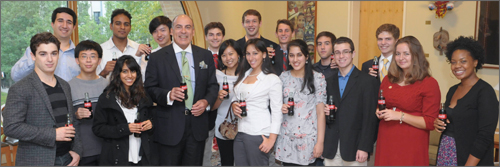
watch video
Muhtar Kent, President and CEO of the Coca-Cola Company,
with Coca-Cola World Fellows at Yale.
This year’s Coca-Cola lecture at the MacMillan Center on October 4 was given by the President and CEO of the Coca-Cola Company, Muhtar Kent. His topic was “Who Will Drive the 21st Century Agenda? Women.”
Kent laid out his program for reaching that goal, both within his company and in the world. The first goal he said, speaking metaphorically since Coca-Cola operates in 206 countries, is “to accelerate women’s leadership within our own four walls.” He said the company established a Women’s Leadership Council in 2007, whose goals include improving work-life balance – a key benchmark to attracting more women in executive positions; promoting women into top positions (several women are already in high leadership roles); and becoming more consumer- , community- , and environmentally-focused. “We know we can’t do any of that without greater participation of women…both at senior ranks, mid-level management, and also entry level,” he said. He noted that since women comprise 70 percent of the purchasers of Coca-Cola products, promoting women’s leadership is good business. “Our business is being ahead of the consumer,” he added, and “women make better salespeople.”
Another goal is to bring more women into the global supply chain. Kent said many women in developing countries are involved in a “micro distribution center network” to get some of Coca-Cola’s 3,000 beverages into areas without roads “using pushcarts or bicycles, because no other vehicles can negotiate the infrastructure that exists in place.” There are now 3,500 such operations in several countries in Africa, employing 20,000 people. “A thousand of these are owned and operated by women,” and he said the company is committed to reaching a 50-50 gender split.
These entrepreneurs receive training in accounting, merchandising and stock rotation, “and they become fabulously successful,” Kent said – often more so than their male counterparts. Globally, he said more than ten million women are employed through the company’s supply chain.
“A few weeks ago,” he added, “we launched a new initiative called ‘5 by 20’ to empower five million more women by 2020.” That effort includes eliminating barriers to credit, addressing cultural and political barriers, and conducting peer networking and basic training.
The third goal is “to stay committed to sustainability initiatives,” even in the current economic downturn. “Water is a huge focus of sustainability efforts,” he said, and the company is working to reduce water use by improving technology – rinsing bottles with air instead of water, for example; capturing water from rain and other sources; and recycling water.
